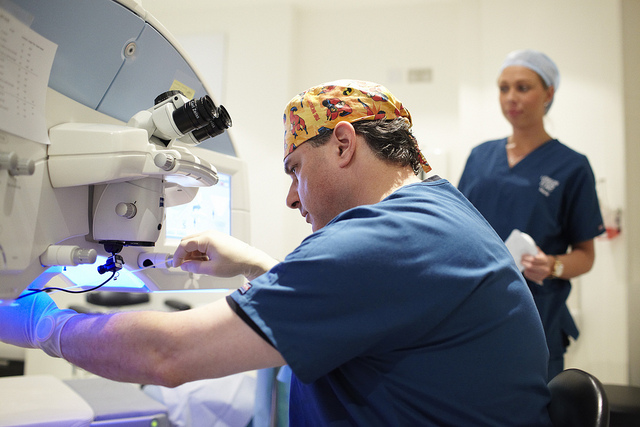Corneal Erosion: The Treatment and Symptoms
Many of us have experienced times when our eyes felt drier than usual, more sensitive to light, or just generally sore and painful. These can often be just passing symptoms of simple stressors such as air conditioning, screen fatigue or getting dust in your eyes.
However, if these symptoms are occurring more regularly or, if you are always experiencing other symptoms such as constant tearing or headaches and blurred vision, this could be a sign of corneal erosion.
What is Corneal Erosion?
Corneal erosion occurs when the layer of cells on the surface of the cornea (the dome-shaped surface of the eye) loosens from the layer underneath. This can cause pain and discomfort in addition to affecting your quality of vision.
It can often occur when you first wake up in the morning, as a result of your eyes drying out while you sleep. This can cause the eyelid to become stuck to the cornea, causing the surface layer of cells (the epithelium) to be peeled off when you open your eyes.
The Symptoms of Corneal Erosion
The cornea covers and protects the front of our eyes, so when the surface layer of this vital component wears away, it can cause irritation and other symptoms. In many cases, this occurs spontaneously, and it is often regarded as one of the most common and neglected ocular disorders.
One of the reasons that corneal erosion is often overlooked is that its symptoms are similar to those of corneal abrasion. Like corneal erosion, corneal abrasion can also cause pain and irritation, redness, sensitivity to light, eye-watering and blurred vision.
However, while corneal abrasion is caused by scratches, scrapes, or cuts on the eye, corneal erosion is caused by a loose attachment of the epithelium to the tissue underneath.
Treating Corneal Erosions
While corneal erosion is often overlooked, treatment is often straightforward, varying from the application of lubricating drops, topical ointments, or a therapeutic contact lens (TCL) which can reduce pain and encourage healing. However, in cases where corneal erosions have occurred repeatedly (recurrent corneal erosion), minor surgery of the corneal surface may be necessary.
Recurrent corneal erosion (RCE) occurs when the corneal epithelium is not properly anchored to the underlying layers of the cornea. Further treatments that may be required include:
- Performance of a procedure called anterior stromal puncture. This involves making tiny holes on the surface of the cornea to promote stronger attachments between the top layer of corneal cells and the layer of the cornea underneath;
- Gentle removal of the damaged epithelium (the outermost layer of the cornea);
- Removal of a small layer of corneal cells using a laser.
Laser Eye Surgery: A Solution to Corneal Erosions
Thanks to its minimally-invasive nature and long-term efficacy, Laser Eye Surgery is increasingly considered a far more attractive option for treating recurrent corneal erosion in addition to those outlined above.
Phototherapeutic keratectomy (PTK) is a type of laser surgery that selectively removes cells on the surface layer of the cornea. PTK can sometimes be used with photorefractive keratectomy (PRK) treatment to also treat any scarring and to correct a refractive error, such as short-sightedness (myopia) or long-sightedness (hyperopia).
At the London Vision Clinic, we do not primarily provide treatment for RCE. However, we are able to provide appropriate advice regarding treatment for patients who show symptoms of RCE during our rigorous screening process.
To find out more about how Laser Eye Surgery can help to treat corneal erosions and find out if you may be a suitable candidate for treatment, get in touch with our team. Alternatively, Book a Consultation today.



